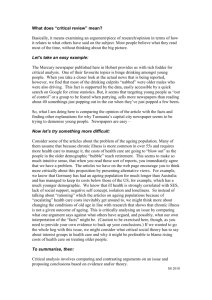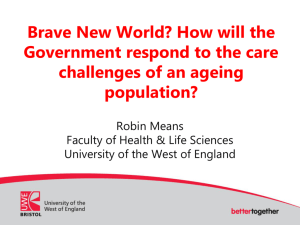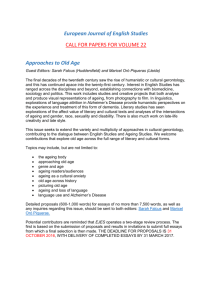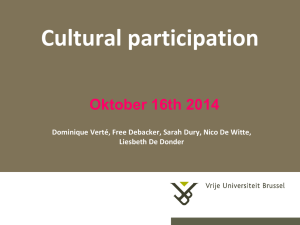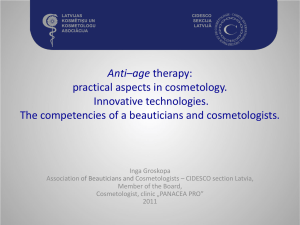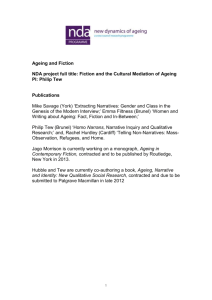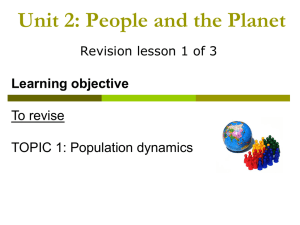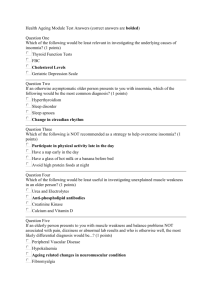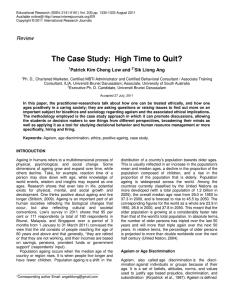A brief introduction to the Social theory of Ageing and Ageism Dr
advertisement
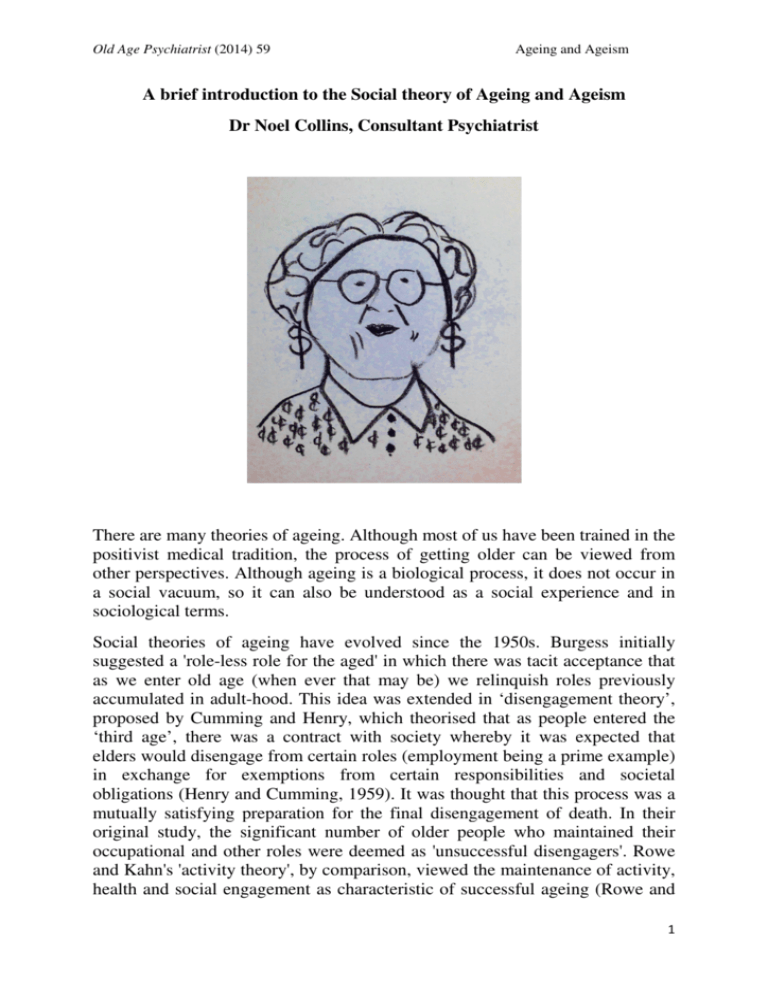
Old Age Psychiatrist (2014) 59 Ageing and Ageism A brief introduction to the Social theory of Ageing and Ageism Dr Noel Collins, Consultant Psychiatrist There are many theories of ageing. Although most of us have been trained in the positivist medical tradition, the process of getting older can be viewed from other perspectives. Although ageing is a biological process, it does not occur in a social vacuum, so it can also be understood as a social experience and in sociological terms. Social theories of ageing have evolved since the 1950s. Burgess initially suggested a 'role-less role for the aged' in which there was tacit acceptance that as we enter old age (when ever that may be) we relinquish roles previously accumulated in adult-hood. This idea was extended in ‘disengagement theory’, proposed by Cumming and Henry, which theorised that as people entered the ‘third age’, there was a contract with society whereby it was expected that elders would disengage from certain roles (employment being a prime example) in exchange for exemptions from certain responsibilities and societal obligations (Henry and Cumming, 1959). It was thought that this process was a mutually satisfying preparation for the final disengagement of death. In their original study, the significant number of older people who maintained their occupational and other roles were deemed as 'unsuccessful disengagers'. Rowe and Kahn's 'activity theory', by comparison, viewed the maintenance of activity, health and social engagement as characteristic of successful ageing (Rowe and 1 Old Age Psychiatrist (2014) 59 Ageing and Ageism Kahn, 1987). Although the theory emphasized the value of agency and individualism, the categorizing of older people as successful or unsuccessful agers was criticised as ignoring the socioeconomic context of individuals. Not everyone had access to resources to ensure 'successful ageing’. A life course perspective then began to emerge to conceptualise ageing. This paradigm emphasised that being older was not a discrete stage of one's life, but rather a phase that reflected the accumulation of life's experience and circumstance. Bernice Neugarten proposed the idea of ‘age norms’ which act as societal accelerators and decelerations on an individual’s behaviour (Neugarten, 1970). The life course perspective highlights the dynamic tension between an individual’s determinism and the structural constraints of society. The approach is particularly helpful when explaining health inequities between different socioeconomic groups in late life, as these widen in response to processes such as cumulative advantage and ‘stress proliferation’ over the lifespan (Pearlin et al., 2005). A life course approach also emphasises the linked nature of our lives and how we age as part of a generational cohort rather than in social isolation. This leads on to some very interesting theory on intergenerational conflict and solidarity. Critical gerontology theories began to emerge in the 1980s, particularly the 'political economy of ageing'. This theory aimed to understand how an individual's social, cultural and economic context influenced their experience of ageing. It considers how political and economic structures challenge and support an individual's agency over their lifespan. Robert Butler won the 1976 Pulitzer Prize for his book ‘Why Survive? Being Old In America’ which explored malign political and economic influences on the experience of aging (Butler, 1975). This included the influence of neo-liberalism. Neo-liberalism argues that market forces are the best allocators of resources, be it houses or healthcare. But, within this system, the poor and other disadvantaged groups are less able to compete for resources. Neo-liberalists view individual merit in terms of economic activity, meaning the older adult who is retired or receiving a pension is viewed as an economic persona non grata. In this way, ageing can be constructed as a social problem. Weekly headlines regarding the ‘pension time bomb’ reinforce negative stereotypes of the elderly as one way consumers of precious resources. However, this neo-liberal rhetoric ignores the many ways in which older adults are vital socio-economically, for example, in their roles as informal carers (for their grandchildren or spouses). Older carers make up a sizeable proportion of informal carers nationally, saving social care £120 billion annually, more than the entire NHS budget (Brindle, 2010). Ageism, like ageing, can be defined in both narrow and broad terms. It can be conceptualised as simply discrimination on the basis of single demographic characteristic akin to sexism or racism, or as more complex construct that 2 Old Age Psychiatrist (2014) 59 Ageing and Ageism affects individuals over the entire lifespan through age-related societal norms and expectations of behaviour. Both the young and elderly can be positively and negatively affected by this. However, ageism can legitimise the use of chronological age to deny resources and opportunity. We know this occurs in many areas of health care from stroke care (Young, 2006) to referral for cognitive behavioural psychotherapy (NHS, 2013; RCPsych, 2013). And on the day that I write this, The Telegraph headlines with ‘Too many needless deaths because elderly cancer sufferers are ‘written off’’. This was prompted by concerns from Macmillan Cancer Support that older patients are denied treatment solely on the basis of their age without assessment of the likelihood that they could benefit from treatment (Donnelly, 2014). However, the reasons for this apparent age based rationing of health care relate not just to policy and practitioner factors but also to patient expectation and subsequent health seeking behaviour (Meisner and Baker, 2013). Next time we will explore health inequalities in later life in more detail and the sociological explanations to account for these. References BRINDLE, D. 2011. Carers save the country £119bn a year. Guardian. 12 May 2011 BUTLER, R. 1975. Why survive? Being old in America, New York, Harper & Row. DONNELLY, L. 2014. Too many needless deaths because elderly cancer sufferers are 'written off'. The Telegraph, 24 Jan 2014. HENRY, W. E. & CUMMING, E. 1959. Personality development in adulthood and old age. J Proj Tech, 23, 383-90. MEISNER, B. A. & BAKER, J. 2013. An exploratory analysis of aging expectations and health care behavior among aging adults. Psychol Aging, 28, 99-104. NEUGARTEN, B. L. 1970. Dynamics of transition of middle age to old age. adaptation and the life cycle. J Geriatr Psychiatry, 4, 71-100. NHS, 2013. IAPT Equalities Older People. http://www.iapt.nhs.uk/equalities/older-people/. PEARLIN, L. I., SCHIEMAN, S., FAZIO, E. M. & MEERSMAN, S. C. 2005. Stress, health, and the life course: some conceptual perspectives. J Health Soc Behav, 46, 205-19. RCPSYCH 2013. Report of the Second Round of the National Audit of Psychological Therapies (NAPT) London: Healthcare Quality ImprovementPartnership. ROWE, J. & KAHN, R. 1987. Human aging: usual and successful. Science, 237, 143-9. YOUNG, J. 2006. Ageism in services for transient ischaemic attack and stroke. BMJ, 333, 508-9. 3
